|
|
|
Sort Order |
|
|
|
Items / Page
|
|
|
|
|
|
|
| Srl | Item |
| 1 |
ID:
132085
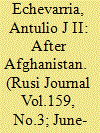

|
|
|
|
|
| Publication |
2014.
|
| Summary/Abstract |
One of the key issues to be discussed at the forthcoming NATO summit will be preparation for future military engagements after more than a decade of counter-insurgency operations in Afghanistan. Antulio J Echevarria II revisits some of the key lessons to be drawn from this experience, and highlights the questions that will need to be addressed if the Alliance is to be equipped to meet future challenges in a changing world.
|
|
|
|
|
|
|
|
|
|
|
|
|
|
|
|
| 2 |
ID:
133289
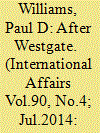

|
|
|
|
|
| Publication |
2014.
|
| Summary/Abstract |
The attack on the Westgate Mall in Nairobi, Kenya, in September 2013 intensified international scrutiny of the war against Harakat Al-Shabaab Mujahideen (Movement of the Warrior Youth). This article analyses the current state of affairs with reference to the three principal sets of actors in this war: Al-Shabaab, the African Union Mission in Somalia (AMISOM) and its international partners, and the various actors currently involved in building the Somali Federal Government's security forces. It argues that although the newly reconfigured Al-Shabaab poses a major tactical threat in Somalia and across the wider Horn of Africa, the movement is becoming a less important actor in Somalia's national politics. As Al-Shabaab loses territory and its popularity among Somalis continues to dwindle, other clan- and region-based actors will become more salient as national debates over federalism, the decentralization of governance mechanisms beyond Mogadishu and the place of clannism will occupy centre stage. As a consequence, AMISOM's principal roles should gradually shift from degrading Al-Shabaab towards a broader stabilization agenda: encouraging a national consensus over how to build effective governance structures; developing an effective set of Somali National Security Forces; and ensuring that the Federal Government delivers services and effective governance to its citizens, especially beyond Mogadishu in the settlements recently captured from Al-Shabaab. As it stands, however, AMISOM is not prepared to carry out these activities. More worryingly, nor is the Somali Federal Government.
|
|
|
|
|
|
|
|
|
|
|
|
|
|
|
|
| 3 |
ID:
188023


|
|
|
|
|
| Summary/Abstract |
The dominant academic narrative portrays British Muslim communities as alienated by counter-terrorism policies and consequently reluctant to cooperate with authorities by taking action against Islamist extremism. This article reassesses and nuances the “alienation narrative” with the use of unique data from three robust surveys of British Muslims. It finds that although a minority shows signs of alienation, most British Muslims are satisfied with and trust counter-terrorism policies as well as the government and the police. The level of willingness to take action against Islamist extremism is also high. The study confirms that aspects of alienation correlate with reduced willingness to take action against Islamist extremism, although they do not necessarily lead to disengagement.
|
|
|
|
|
|
|
|
|
|
|
|
|
|
|
|
| 4 |
ID:
132298
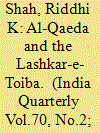

|
|
|
|
|
| Publication |
2014.
|
| Summary/Abstract |
Study of ideology is one of the most important domains of consideration for a successful counter-terrorism strategy. It is necessary to know and understand the ideology of a terrorist outfit coupled with the ongoing evolution at the same, its chief ideologues and its target audiences in order to provide an alternative ideology or in other words to win the 'hearts and the minds' of the people. This article traces the mounting similitude in the discourse and the actions of Lashkar-e-Taiba and the ideology of Al-Qaeda. The article begins with a brief depiction of the debate on the 'end of ideology' before proceeding on to an examination of Al-Qaeda's ideology. In the next section, LeT's discourse and actions from 1990 to 2010 are scrutinised followed by an analysis that attempts to draw out parallels between the ideologies of the two terrorist organisations. In the last section, the conclusion raises several pertinent points for the consideration of counter-terrorist specialists and policy makers.
|
|
|
|
|
|
|
|
|
|
|
|
|
|
|
|
| 5 |
ID:
091487


|
|
|
|
|
| Publication |
2009.
|
| Summary/Abstract |
This article examines the ways and means in which states employ irregular and indigenous personnel in a counter-insurgency (COIN) or counter-terrorist (CT) campaign, in the historical and contemporary context. The authors clarify the terminology surrounding this neglected area of COIN/CT theory, and identify four types of indigenous assistance - individual actors (trackers, interpreters, informers and agents); home guards and militias; counter-gangs; and pseudo-gangs. This article concludes that while the use of such indigenous irregulars has its advantages for the state and its armed/security forces (particularly as far as intelligence, local knowledge and undermining the insurgent's cause is concerned), it can also have serious practical and ethical implications for a COIN/CT campaign, and can have unexpected and unwelcome consequences including violations of laws of armed conflict, the undermining of governmental authority and the prospects of endemic internal strife and state collapse.
|
|
|
|
|
|
|
|
|
|
|
|
|
|
|
|
| 6 |
ID:
163109
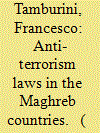

|
|
|
|
|
| Summary/Abstract |
This article sheds light on the counter-terrorism measures enacted by the Maghreb countries, with a comparative approach of the laws in Algeria, Mauritania, Morocco, and Tunisia. Carried out by comparing the Arabic and French original versions, the analysis revealed a common attitude that tended to preserve national security at the expenses of civil freedoms and human rights. In almost all cases, anti-terrorism laws strayed away from their supposed initial finality – fighting terrorism – tackling other issues such as the maintenance of public order or indirectly the control of dissidence and political opposition, with no or scarce legal checks and balances that could restrict possible police or judiciary abuses towards civil and political rights. The legal measures significantly delayed both the first transition to democracy in the region in the 2000s as well as the promising development after the ‘Arab spring’.
|
|
|
|
|
|
|
|
|
|
|
|
|
|
|
|
| 7 |
ID:
132212
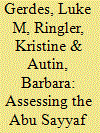

|
|
|
|
|
| Publication |
2014.
|
| Summary/Abstract |
It remains unclear whether the Abu Sayyaf Group (ASG) is a well-structured terror organization that poses a strategic threat, or a loosely organized collection of bandits that poses limited risk. Efforts to assess the nature of the organization are complicated by flaws in existing datasets on Violent Non-State Actors (VNSAs). ASG's role in kidnappings serves as a test-case to estimate incongruities among four major datasets on VNSAs. Original data collected at the agent level provides an additional point of comparison and also serves to test the efficacy of ASG's knowledge-dissemination structures, which are key in determining VNSAs' strategic capacities.
|
|
|
|
|
|
|
|
|
|
|
|
|
|
|
|
| 8 |
ID:
101144
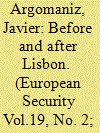

|
|
|
|
|
| Publication |
2010.
|
| Summary/Abstract |
Implementation has often been described as a key weakness affecting European Union (EU) counter-terrorism. However, this view is often adopted as a given and there has not been so far a systematic examination of the degree to which this represents an obstacle to the effectiveness of the EU response. This paper aims to contribute towards this goal through the use of primary sources in the study of the legal transposition of counter-terror instruments into national law, a key stage in the implementation process. It shows the presence of major implementation delays in this policy sector but, importantly, also significant cross-national variation with regards transposition failure associated with the administrative endowment of the individual member states. Furthermore, the mechanisms deployed by the Union to encourage a fluid implementation of European measures are critically evaluated and the potential impact in the process of the institutional transformations brought about by Lisbon is also examined.
|
|
|
|
|
|
|
|
|
|
|
|
|
|
|
|
| 9 |
ID:
161617
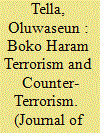

|
|
|
|
|
| Summary/Abstract |
Given terrorists’ use of violence in pursuit of their objectives and violent counter-terrorism measures, terrorism is not often associated with soft power. Nevertheless, terrorist organisations subscribe to ideologies that are appealing to certain individuals and/or segments within their immediate environment and beyond. Similarly, counter-terrorism initiatives that embrace the utility of soft power might be more successful than those that rely on the use of naked force. While the soft power of terrorist organisations has received scant attention, there has been modest scholarly inquiry into a soft power approach to counter-terrorism. However, no comprehensive research has been conducted on the place of soft power in Boko Haram’s activities and the Nigerian government’s efforts to end their campaign. This article offers a new perspective to the burgeoning literature on Boko Haram terrorism by examining whether or not it possesses elements of soft power that are appealing to certain Nigerians. It also examines if the Nigerian government has adopted a soft power approach in its counter-terrorism efforts. The article concludes that effectively tackling the sect will require a smart power strategy
|
|
|
|
|
|
|
|
|
|
|
|
|
|
|
|
| 10 |
ID:
144900
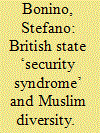

|
|
|
|
|
| Summary/Abstract |
This paper explores the securitisation of British Muslims within a global context in which tensions are reignited by the threat that Islamist terrorism, and Islam more generally, are considered to pose to the West. While Western involvement in Muslim-majority countries continues to fuel the idea of a ‘clash of civilisations’, domestic responses to terrorism and extremism take forward its rhetoric. At the heart of 15 years of wide-ranging responses lies the state ‘security syndrome’. Operating through the paradigm of risk reduction, the British state has reasserted its primary role as the distributor of security in ways that move beyond the surgical targeting of violent Islamists and their supporters and instead risk impacting on Muslims qua Muslims. Counter-terrorism and anti-extremism notions and practices that conflate security risks and cultural threats signal that Great Britain is a liberal democracy that is yet to fully foster positive inter-community relations and achieve social cohesion.
|
|
|
|
|
|
|
|
|
|
|
|
|
|
|
|
| 11 |
ID:
134004
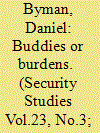

|
|
|
|
|
| Publication |
2014.
|
| Summary/Abstract |
Drawing on organization theory, this article argues that al Qaeda seeks affiliates to expand the scope and scale of its operations, gain the benefits of greater local expertise, better spread innovations, and?most important?endow itself and its mission with greater legitimacy. The conventional wisdom on al Qaeda affiliates emphasizes these benefits and thus paints affiliation as a tremendous boon to al Qaeda that magnifies the danger of terrorism. However, al Qaeda faces a host of problems related to delegation and integration, and often affiliation is a net loss. Divergent preferences and priorities, branding problems, shirking at the local level, adverse selection, and costly control mechanisms all make affiliates of questionable value to the core organization. Although the danger al Qaeda poses may have morphed with the core declining and the affiliates rising in importance, the broader movement is probably less dangerous than it was when the al Qaeda core was at its height. US counterterrorism often magnifies these integration problems and, if done well, can further induce friction, discredit the brand, and otherwise throw sand in the gears. The broader study of al Qaeda and its affiliates also offers insight into the study of organizations in general.
|
|
|
|
|
|
|
|
|
|
|
|
|
|
|
|
| 12 |
ID:
133050
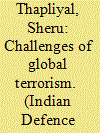

|
|
|
|
|
| Publication |
2014.
|
| Summary/Abstract |
There should be no distinction between a good and a bad terrorist which is what some countries are trying to do. The scourge will consume all unless it is ruthlessly eliminated. Countries sponsoring terrorism might realise that it is like riding a tiger that, one day, they might tall prey to. The biggest worry at these countries which have sulterecl at the hands at terrorists is that Weapons of Mass Destruction may fall into the hands at the terrorists and that catastrophic consequences would tollowi A worldwide integrated approach to tackling terrorism is, therefore, a must.
|
|
|
|
|
|
|
|
|
|
|
|
|
|
|
|
| 13 |
ID:
161001
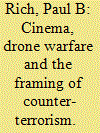

|
|
|
|
|
| Summary/Abstract |
The study of the cinematic representation is extremely useful in framing of counter-terrorism policies, whether in the US or elsewhere. This paper examines cinema’s interest in drone warfare as well as the lives and personalities of drone pilots. It argues that drone warfare suffers a considerable image problem that has been brought out in several recent features and it is unlikely that any major cinematic myth of drone warfare will easily develop, certainly in comparison to myths concerning special forces and special operations.
|
|
|
|
|
|
|
|
|
|
|
|
|
|
|
|
| 14 |
ID:
129500
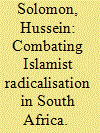

|
|
|
|
|
| Publication |
2014.
|
| Summary/Abstract |
Is radical Islamism spreading in South Africa? The answer has to be an emphatic 'yes'. When discussing issues of radicalisation in Africa, commentators often examine the case of Somalia's al-Shabaab or al-Qaeda's North African franchise, al-Qaeda in the Islamic Maghreb (AQIM). Very little attention is paid to radicalisation amongst South Africa's Muslim population. Yet, there is growing evidence that South Africa has come to play an important role in global jihadi networks, from the provision of safehouses and identity documents to the movement of funds and the existence of paramilitary camps for local and foreign jihadis. This paper aims to briefly examine radicalisation and its attendant sources in the country, as well as seeking ways to combat it utilising lessons learned from other countries. 'Institutional socialisation' by means of the sources of radicalisation, as well as the concept of what could be termed 'the democratisation of jihad' are discussed. The author also proposes ways to combat radicalisation in South Africa utilising lessons learned from other countries, concluding that issues of radicalisation and deradicalisation have to be dealt with on the part of both government and the South African Muslim community.
|
|
|
|
|
|
|
|
|
|
|
|
|
|
|
|
| 15 |
ID:
012713
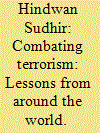

|
|
|
|
|
| Publication |
May-June 1997.
|
| Description |
60-71
|
|
|
|
|
|
|
|
|
|
|
|
|
|
|
|
| 16 |
ID:
132196
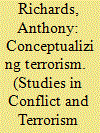

|
|
|
|
|
| Publication |
2014.
|
| Summary/Abstract |
This article argues that, while there have always been good reasons for striving for a universally agreed definition of terrorism, there are further reasons for doing so in the post 9/11 environment, notwithstanding the formidable challenges that confront such an endeavour. Arguing that the essence of terrorism lies in its intent to generate a psychological impact beyond the immediate victims, it will propose three preliminary assumptions: that there is no such thing as an act of violence that is in and of itself inherently terrorist, that terrorism is best conceptualized as a particular method of political violence rather than defined as inherent to any particular ideology or perpetrator, and that non-civilians and combatants can also be victims of terrorism. It will then outline the implications that these assumptions have for the definitional debate.
|
|
|
|
|
|
|
|
|
|
|
|
|
|
|
|
| 17 |
ID:
012508
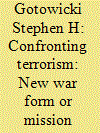

|
|
|
|
|
| Publication |
May-June 1997.
|
| Description |
61-66
|
|
|
|
|
|
|
|
|
|
|
|
|
|
|
|
| 18 |
ID:
130986
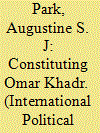

|
|
|
|
|
| Publication |
2014.
|
| Summary/Abstract |
Until 2012, Omar Khadr was both the only former child soldier and Western national left in Guantanamo Bay. Captured by US forces at the age of 15, this Canadian youth would spend more than 40% of his life in US custody during the War on Terror. This article advances two key arguments. First, as a child soldier, Khadr is simultaneously cast as an object of sympathy and suspicion. The construction of Khadr's childhood is animated by a cultural racism, which casts Khadr as both a victim of an extremist family and the evil outcome of a "jihadi" upbringing. Second, this article examines competing culturally racialized claims about citizenship, prompted by the failure of the Canadian government to seek Khadr's repatriation. While the central preoccupation of liberal citizenship discourse is the erosion of Canada's identity as a Western, liberal democracy, "racial-nationalist" discourse raises the alarm on the threat posed by "citizens of convenience" who must be cast out of the polity through practices of "pure exclusion."
|
|
|
|
|
|
|
|
|
|
|
|
|
|
|
|
| 19 |
ID:
013529
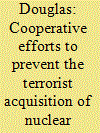

|
|
|
|
|
| Publication |
Autumn 1997.
|
| Description |
169-78
|
|
|
|
|
|
|
|
|
|
|
|
|
|
|
|
| 20 |
ID:
093365
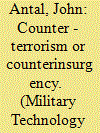

|
|
|
|
|
|
|
|